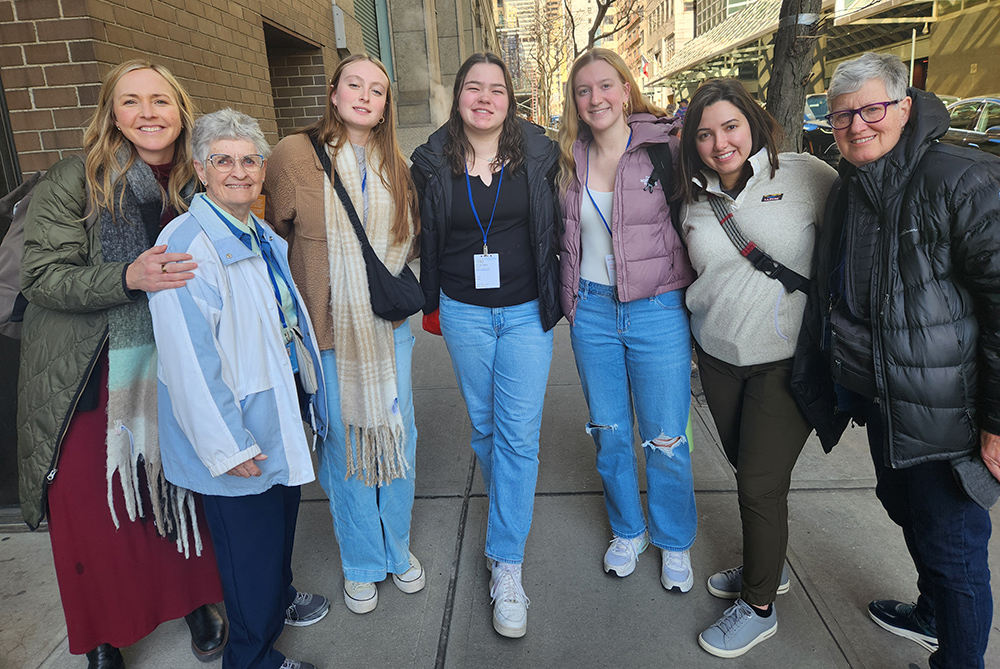
Sr. Roberta White, a member of the Sisters of Charity of the Blessed Virgin Mary in Dubuque, Iowa, second from left, with other participants at the United Nations' Commission on the Status of Women. She and others attended as members of a delegation representing the Loretto Community. The Loretto Community has been partnering with the Sisters of Charity of the Blessed Virgin Mary of Dubuque since 2011. This year, Loretto Community's UN representative Beth Blissman hosted a delegation of 40 participants with 28 attendees hailing from four U.S. high schools. (GSR photo/Chris Herlinger)
Editor's note: This story is part of Global Sisters Report's yearlong series, "Out of the Shadows: Confronting Violence Against Women," which will focus on the ways Catholic sisters are responding to this global phenomenon.
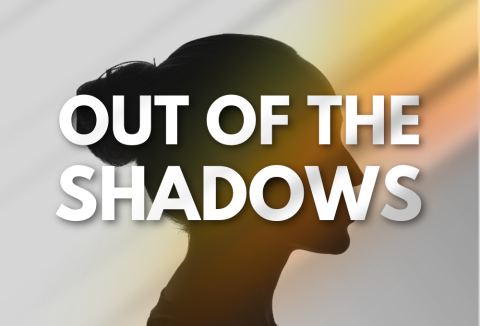
(GSR logo/Olivia Bardo)
Catholic sisters, joining thousands of other women from throughout the world in two weeks of meetings, networking and celebratory sisterhood at the United Nations, marked the 30th anniversary of the landmark 1995 Beijing Declaration and Platform for Action with both jubilation and sober assessment.
In public presentations and interviews with Global Sisters Report, sisters who attended the 69th session of the United Nations' Commission on the Status of Women (March 10-21), which focused on assessing the Beijing legacy, spoke of a dual reality: of progress for women and girls in some areas and yet still frustrating challenges and pushback to gains made over three decades.
With what many see as the global rise of authoritarianism and misogyny, the Commission on the Status of Women gave participants a chance to speak, reflect and re-energize for what sisters and others called a pivotal moment for women's rights.
"CSW69 showed that, more than ever, we are facing the rollback of women's rights in many parts of the world," said Sr. Michelle Loisel, who represents the Company of the Daughters of Charity of St. Vincent de Paul at the U.N.
Advertisement
"Whether through restricted access to education, or employment, women continue to bear the brunt of economic downturns, especially in the Global South," Loisel told Global Sisters Report.
That theme was also addressed by Gabriella Gambino, under-secretary of the Dicastery for Laity, Family and Life. She headed the Holy See delegation to the Commission on the Status of Women.
Equality, Gambino said in remarks delivered March 13 at the U.N., "requires not only the recognition of women's dignity, but also conditions in which they can enjoy equal opportunities. In this regard, poverty eradication is key, especially because it affects women most: there can be neither development nor peace if the dignity of women is undermined by poverty."
Whatever the challenges, recent events have proven that rights are not guaranteed, said Sr. Janet Palafox. Rather, "we have to fight to protect them."
"We have work to do," said Palafox, the NGO representative to the U.N. for the Institute of the Blessed Virgin Mary-Loreto Generalate. "We have to support each other right now."
Loisel agreed, saying that while progress has often been slow, "it's important not to be discouraged."
Given the multiple global crises — armed conflicts, climate change, economic instability and persistent gender-based violence — Loisel said that the Commission on the Status of Women served as a space where U.N. member states and non-governmental groups like hers "pushed for more substantial commitments to women's rights and systemic change."
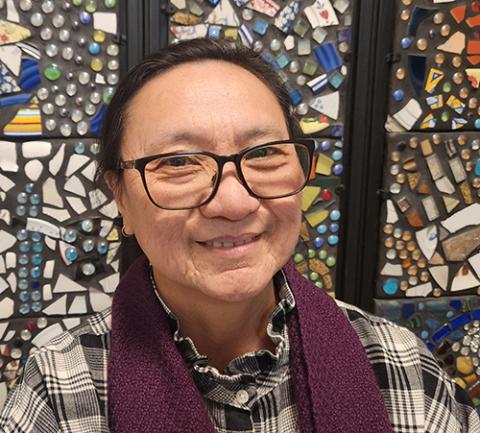
Sr. Janet Palafox is NGO representative to the U.N. for the Institute of the Blessed Virgin Mary-Loreto Generalate. (GSR photo/Chris Herlinger)
"Women's rights are under siege"
The political declaration that emerged out of the Commission on the Status of Women noted that 30 years after the Beijing conference, "no country has fully achieved gender equality and the empowerment of women and girls" and that overall progress in implementing areas of concern "has been slow and uneven, that major gaps and obstacles remain … [such as] structural barriers, discriminatory laws and practices, gender stereotypes and negative social norms."
Also worrying, the document said, are "all forms of violence and discrimination against women and girls, including domestic violence, armed conflict and the feminization of poverty, and that significant levels of inequality persist globally, including underrepresentation in decision-making at all levels, and that many women and girls experience multiple and intersecting forms of discrimination, vulnerability and marginalization throughout their [lives.]"
In his opening remarks on the first day of the Commission on the Status of Women, U.N. Secretary-General António Guterres sounded a somber note, saying that "women's rights are under siege."
"The poison of patriarchy is back — and it is back with a vengeance," he said, describing what is happening as "slamming the brakes on action; tearing-up progress; and mutating into new and dangerous forms."
But, he said, the "antidote is action. Now is the time for those of us who care about equality for women and girls to stand up and to speak out."
"There can be neither development nor peace if the dignity of women is undermined by poverty."
— Gabriella Gambino
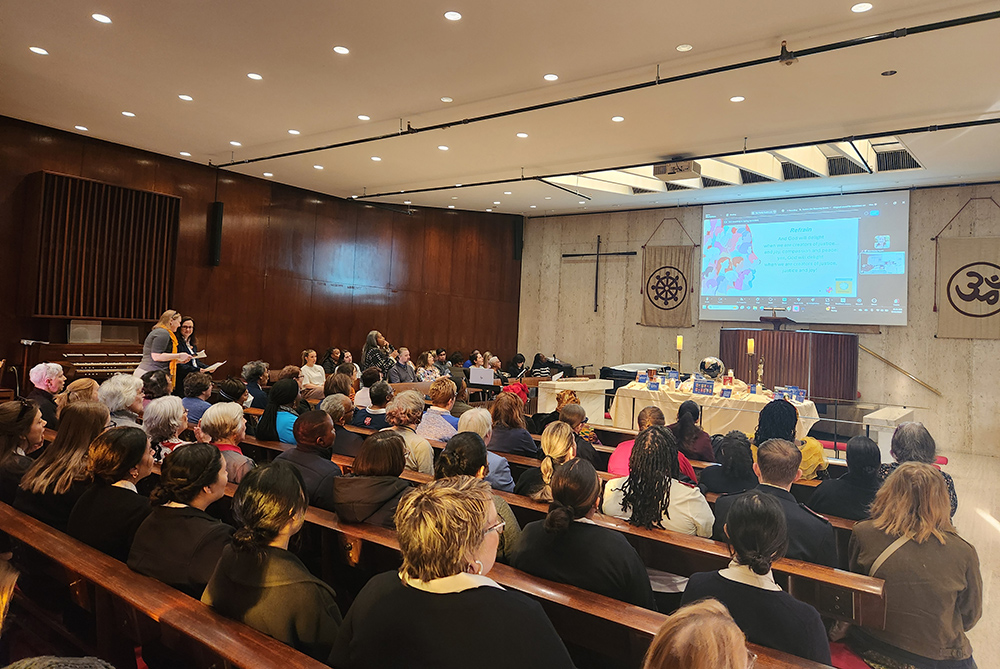
An opening prayer service on March 10 at the chapel of the Church Center for the United Nations during the first day of the 69th Commission on the Status of Women at the U.N. (GSR photo/Chris Herlinger)
That was implicit in presentations Catholic sisters and others made during numerous parallel events held outside U.N. headquarters.
During a March 20 event at the Church Center for the United Nations promoting the rights of women experiencing forced migration, Monica Santamarina, the general president of the World Union of Catholic Women's Organizations, said "the world is witnessing unprecedented levels of human mobility, with millions of women undertaking journeys as migrants or refugees."
Between 2000 and 2015, she said, the number of international migrants increased by 41%, reaching 244 million persons — "almost half of them women," she said. Among the challenges they face, she said, are gender-based violence, including sexual violence, domestic abuse and trafficking, and health-related problems, including lack of access to health care.
Such migrants are also economically vulnerable — particularly those who are heads of households or caregivers who struggle to provide during forced migration.
At the same time, Santamarina said, women migrants "are agents of change who contribute significantly to the social, economic and cultural development of both their host and home communities."
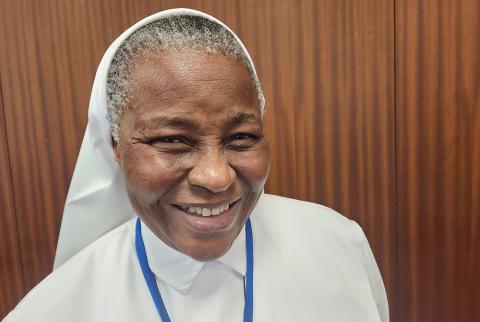
Sr. Ngozi Frances Uti, a member of the Congregation of the Handmaids of the Holy Child Jesus, heads the Centre for Women Studies and Intervention in Abuja, Nigeria. She spoke at a March 20 presentation on women and migration. (GSR photo/Chris Herlinger)
Sr. Ngozi Frances Uti, a member of the Congregation of the Handmaids of the Holy Child Jesus, heads the Centre for Women Studies and Intervention in Abuja, Nigeria. In her presentation on March 20, she noted that in her country, millions are migrating as a result of armed conflicts, banditry, insurgency and climate change.
Women and girls are often the most affected. As a result, Uti said, females "face challenges as they are exposed to violent acts such rape, killings, abduction and forced marriage."
Yet, like Santamarina, Uti noted that the overall situation is not fully bleak. She said that the "migration experience of Nigerian women migrants is dynamic," underscoring "the interplay of history, culture and socioeconomic factors."
Women's migration experiences "reflect a shift from traditional perceptions of women as passive to actively [being] involved and contributing to economies of Nigeria through remittances."
Still, while migration offers opportunities for economic empowerment and social mobility, Uti said that should not minimize the fact that women migrating are exposed "to vulnerabilities such as exploitation, trafficking and discrimination."
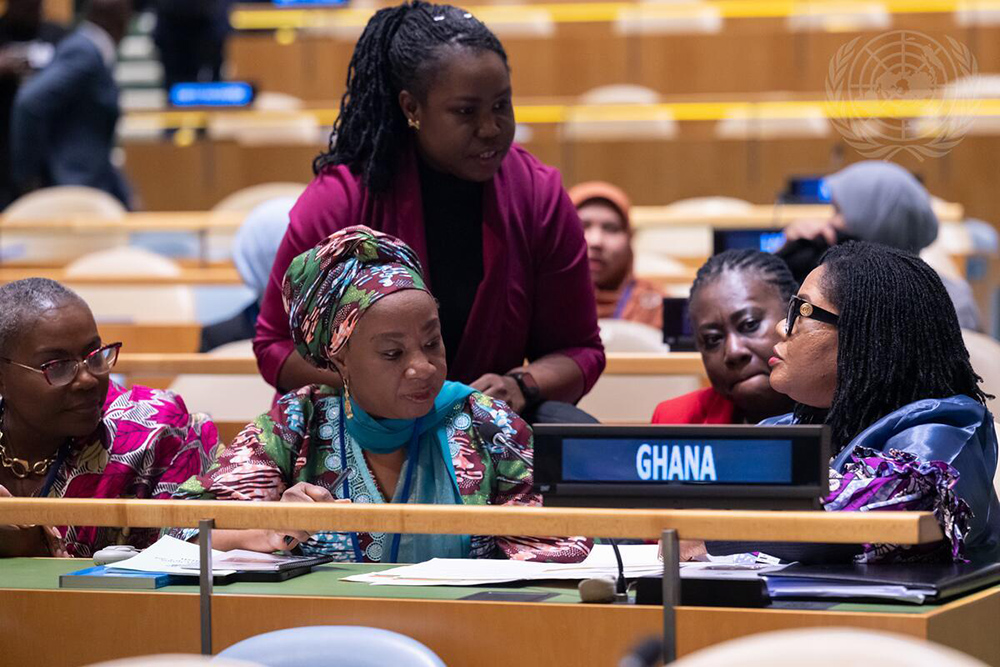
Participants before the March 10 opening of the 69th session of the Commission on the Status of Women at United Nations Headquarters in New York. (United Nations/Manuel Elías)
Changing laws and culture
Those types of vulnerabilities and examples of violence were addressed frequently during the Commission on the Status of Women, a fact noted by three sisters with long experience with advocacy at the United Nations.
Adrian Dominican Sr. Durstyne "Dusty" Farnan, who represents the Dominican Leadership Conference at the United Nations, Daughter of Wisdom Sr. Jean Quinn, who heads the U.N.-based advocacy group UNANIMA International, and Sr. Barbara Bozak, the U.N. representative for the Congregation of Sisters of St. Joseph, all spoke of the violence that overshadows and haunts the lives of many women.
In a joint interview on the last day of the commission, the three sisters said laws protecting women are, of course, welcomed and needed. But when laws are not enforced, as they often are not, "women don't have a place to go," Bozak said.
"Laws are only as good as their enforcement," Farnan said. "We need to change laws but we also need to change the culture." And that won't be easy, she said, noting the persistent and stubborn shadow of male dominance and patriarchy over most cultures. "Men are afraid to lose their power. And so they are pushing back."
The sisters said while the issue of violence against women is now more visible than it was 30 years, much still remains hidden.
Violence persists.
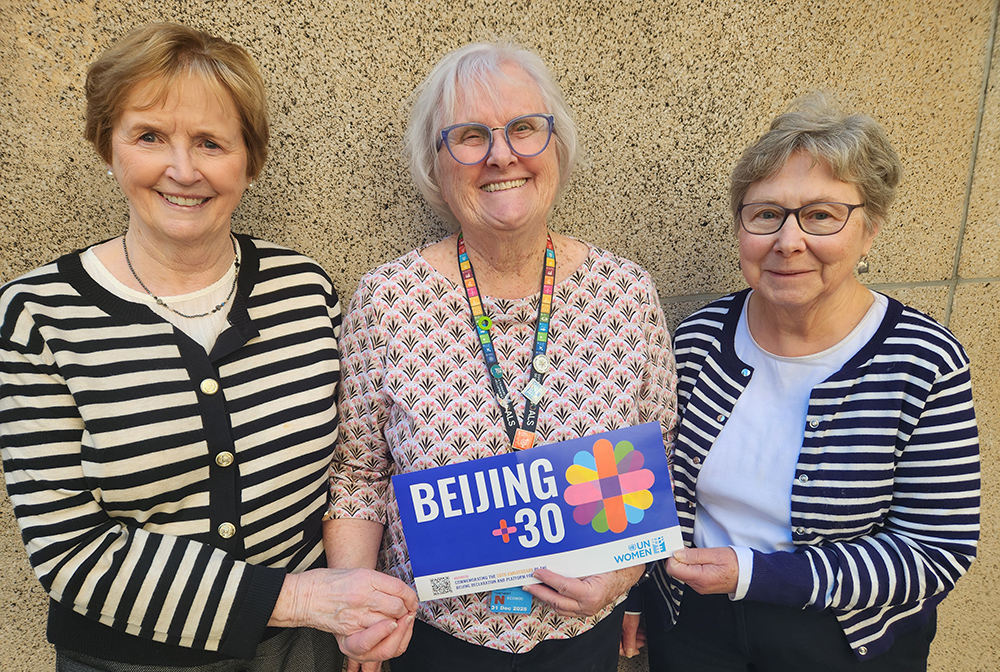
Displaying the theme of the United Nations' 69th Commission on the Status of Women — 30 years since the 1995 Beijing Declaration and Platform for Action — were, from left to right, Daughter of Wisdom Sr. Jean Quinn, who heads the U.N.-based advocacy group UNANIMA International; Adrian Dominican Sr. Durstyne "Dusty" Farnan, who represents the Dominican Leadership Conference at the U.N.; and Sr. Barbara Bozak, U.N. representative for the Congregation of Sisters of St. Joseph. (GSR photo/Chris Herlinger)
"Laws are only as good as their enforcement. We need to change laws but we also need to change the culture."
— Adrian Dominican Sr. Durstyne "Dusty" Farnan
"Violence against women is not changing," Quinn said, adding that at public forums like the Commission on the Status of Women, more needs to be done so that women can speak even more freely about their life experiences.
"Women do have more of a voice now," she said, assessing the last 30 years. "But that [public] voice needs to increase even further."
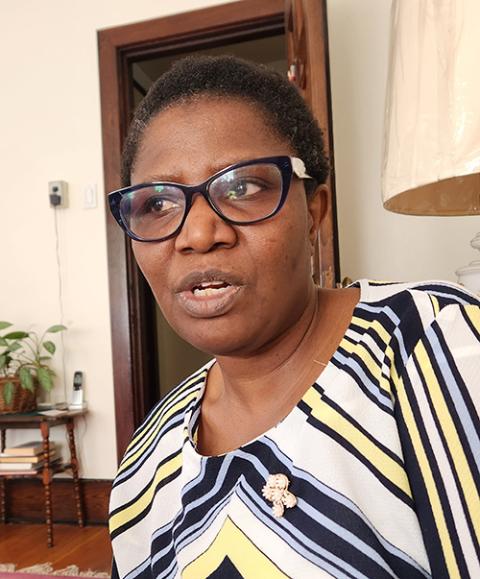
Commission on the Status of Women participant Sr. Kayula Lesa, a Zambian sister and member of the Religious Sisters of Charity. (GSR photo/Chris Herlinger)
Commission participant Sr. Kayula Lesa, director of Talitha Kum Zambia and member of the Religious Sisters of Charity, told Global Sisters Report that as she reflected on the Commission on the Status of Women, she realized that "much of what was being discussed are issues that have been discussed over and over, which is very important, but perhaps, more action than words, is needed at every level now."
The call now, she said, is for "more action than talk."
Another commission participant, Sr. Roberta White, a member of the Sisters of Charity of the Blessed Virgin Mary in Dubuque, Iowa, said that calls for action were a key "takeaway" from a commission session she attended focused on the generational effects of war and conflict.
The world "is facing the highest number of violent conflicts since the Second World War and 2 billion people — a quarter of humanity — live in places affected by such conflict," the U.N. said in 2023.
When she heard that statistic at the Commission on the Status of Women, White said she reacted with a "shattered heart."
"These traumas will have unimaginable consequences for future generations," she said. "We must find and fund peace movements now. Especially for our young."
As for progress in the last 30 years, White said, "We have seen it all — some good advancements, some discouraging regression and some places of no movement whatsoever."
Paraphrasing Guterres and affirming an oft-heard theme of the commission, she said, "Do not give up. Push the pushback."








